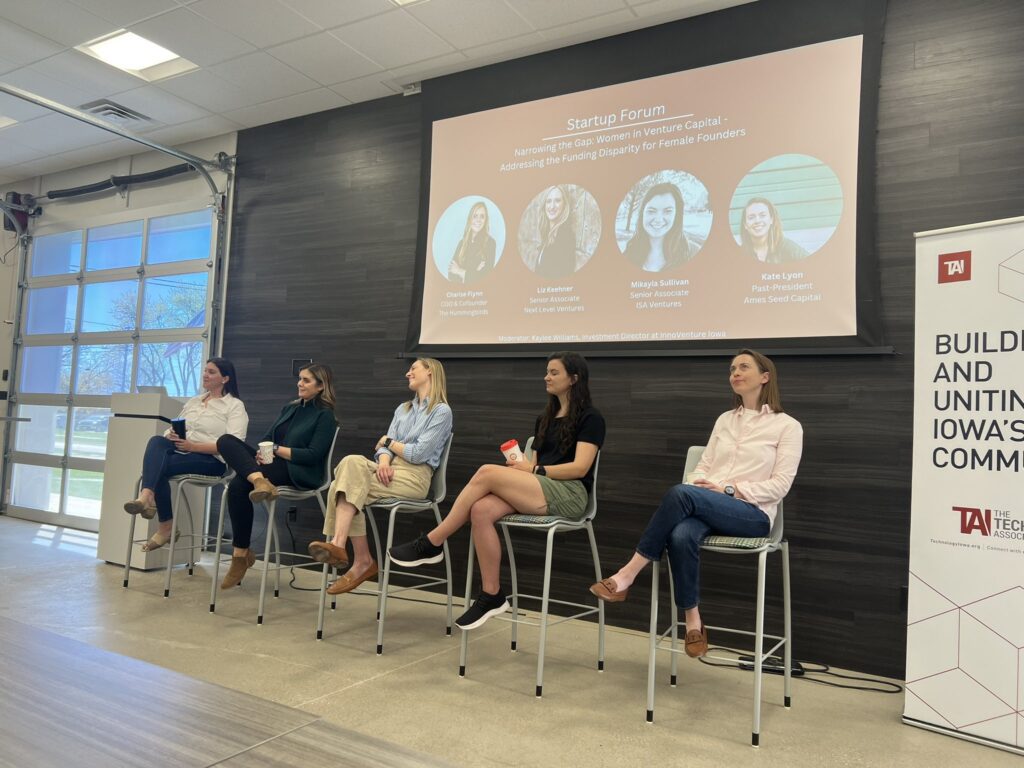Last month, we organized a panel in concert with the Technology Association of Iowa to discuss the topic of women in venture capital, specifically as it relates to the number of women-led startup companies that receive venture funding. Statistics show us that despite women’s significant contributions to the business world, less than 2% of venture capital funds are allocated to female entrepreneurs.
Our panelists were Charise Flynn, co-founder and COO of the Hummingbirds, Liz Keehner, Senior Associate at Next Level Ventures, Mikayla Sullivan, Associate at ISAV and Kate Lyon, attorney and former President of Ames Seed Capital. Some key takeaways from that panel are outlined below.

Include more women in startup environments to create more female-led startups.
This concept is illustrated beautifully in the book “Multipliers” by Liz Wiseman. Including more women in startup companies, communities, and within service provider organizations will directly result in an increase in women-led startups. Exposure to startups – especially from within a scaling company – is a terrific way to get women excited about the prospect of building their own solutions and teams. This is an elegant solution to rather complex problem: simply include more women in the conversations, events and companies that make up the ecosystem. The rest will follow.
Educate female founders on the process of raising venture capital.
Developing educational programming, public forums and cultivating an environment of mentorship are all key to breaking down the information barriers that exist today as it relates to raising venture capital. It can be a daunting task, but here in Iowa there are many resources available to guide women-led startups through the process of developing the relationships necessary to successfully negotiate deal terms in a round of investment. If you ask us (here at InnoVenture Iowa), we don’t believe that this information barrier is specific to women, but many entrepreneurs in Iowa could likely use more programming and informational forums to help guide their efforts in securing the capital they need to grow.
Acknowledge attribution bias.
In psychology, an attribution bias is a cognitive bias that refers to the systematic errors made when people evaluate or try to find reasons for their own and others’ behaviors. We constantly make attributions in the form of judgements and assumptions about why people behave in certain ways.
As it relates to the topic at-hand, our panelists pointed out that VC’s (and the business world somewhat generally) tend to see the very same traits celebrated in men as negative qualities when they are demonstrated by women: things like assertiveness, strong leadership and confidence in men become aggressiveness, bossiness and egotism in women. Understanding and recognizing this attribution bias is key to overcoming its influence and ultimately leveling the playing field for women.
Raising capital from VC’s isn’t a milestone: getting customers is.
We celebrate venture capital investments in startup companies because they are a relatively public indication of investor confidence, but raising capital is not a growth metric, or even a guarantee of success to come. Our panelists inserted a little brevity into the conversation last month by reminding the room that raising capital isn’t nearly as important as earning (and retaining) customers.
Build a diverse portfolio to mitigate risk.
The data shows us that when women-led startups do get funded, they’re more likely to be successful. In 2018, a Boston-based consulting group found that women-led startups “ultimately deliver higher revenue [to investors] – more than twice as much per dollar invested.”
It’s possible that because women face more barriers to entry in this industry, including a higher degree of scrutiny from venture capitalists, the ones that do receive funding have to have stronger business models and better market positioning. It might also be true that women who can effectively navigate this landscape demonstrate high marks in the areas of resilience and adaptability, two key traits that all successful entrepreneurs share.
Either way, investing in women-led startups isn’t just the right thing to do – it’s good for business.
VC’s should invest in companies that have a human-centered, highly collaborative approach.
Interestingly, women-led startups tend to hire more women than those led by men.
Startups with a female founder fill their staffs with 2.5 times more women, according to an analysis by Kauffman Fellows, a program designed to accelerate entrepreneurs’ success. Companies with a female founder and a female executive hire six times more women.
This is how we improve gender diversity in startups, and ultimately deliver on our promise as venture capitalists to invest in more women-led startup companies.